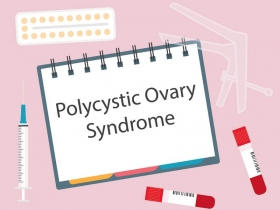PCOS and Fertility Treatments
PCOS impacts many people and limits their chances to conceive naturally. Luckily, IVF exists and can help those who wish to conceive but struggle with fertility due to PCOS. Does IVF look any different for this with PCOS? Will the chances of success be the same for a person with IVF? These are questions many people ask who have PCOS and are curious about starting the IVF process.
What is PCOS?
Polycystic ovary syndrome or PCOS is a condition that affects how ovaries work. PCOS may cause irregular periods meaning one’s ovaries don’t release eggs regularly, excess androgen a male hormone that may increase body hair, and polycystic ovaries, these are enlarged ovaries that are filled with fluid-filled sacs that surround the eggs. Weight fluctuation is common for those with PCOS and this can be treated with a healthy and balanced diet.
Fertility issues are common for those who have PCOS due to irregular periods and other factors. Many people with PCOS need fertility medication or IVF to conceive. PCOS is not a diagnosis of definite infertility and many people with PCOS are still able to conceive. [1]

How can IVF help those with PCOS?
PCOS impacts fertility for many people and IVF can be the solution for some when it comes to having a successful pregnancy. About 80% of people with anovulatory infertility, which means the egg doesn’t drop during ovulation, have PCOS. There are other methods to try before beginning with IVF for those who have PCOS and anovulatory infertility. Usually for people who are struggling with obesity lifestyle changes will be recommended and if this fails a gastric bypass may be used. Ovulation induction therapy can also be used to achieve pregnancy and has a lower risk of having multiple births.
IVF is used when people are not responsive to ovulation induction therapy or have additional infertility factors. Doctors will take the patient’s diagnosis of PCOS into consideration when planning IVF treatment. Some medications may need to be altered for those with PCOS to avoid overstimulating the ovaries. IVF can be very helpful for those with PCOS and many people with PCOS have great results with IVF. [2]
Are there risks for those with PCOS undergoing IVF?
There are some risks to be aware of if you have PCOS and are considering IVF. Those with PCOS usually need to use fertility treatments such as ovulation induction using clomiphene citrate, gonadotropins, or in vitro fertilization. These treatment methods can cause multiple pregnancies, a higher risk for gestational diabetes, and preeclampsia. Pregnancies that are a success from IVF can have a higher risk for maternal complications.
Those with PCOS have an increased risk for complications during pregnancy and birth. Assisted reproductive technology is not necessarily the cause of these complications. Increased monitoring of those pregnant with PCOS is necessary to ensure safety. It is difficult to explain why these risks are more common for those with PCOS. If you have PCOS your doctor should explain these risks to you and what can be done to make IVF safer for you. IVF, like all treatments, has its risks, but it is up to your doctor and ultimately you to decide what path you take to feel the safest throughout your fertility journey. [3]
Sources:
[1] https://www.nhs.uk/conditions/polycystic-ovary-syndrome-pcos/
[2] Balen AH, Morley LC, Misso M, Franks S, Legro RS, Wijeyaratne CN, Stener-Victorin E, Fauser BC, Norman RJ, Teede H. The management of anovulatory infertility in women with polycystic ovary syndrome: an analysis of the evidence to support the development of global WHO guidance. Hum Reprod Update. 2016 Nov;22(6):687-708. doi: 10.1093/humupd/dmw025. Epub 2016 Aug 10. PMID: 27511809.
[3] Tandulwadkar SR, Lodha PA, Mangeshikar NT. Obstetric complications in women with IVF conceived pregnancies and polycystic ovarian syndrome. J Hum Reprod Sci. 2014 Jan;7(1):13-8. doi: 10.4103/0974-1208.130802. PMID: 24829525; PMCID: PMC4018791.






